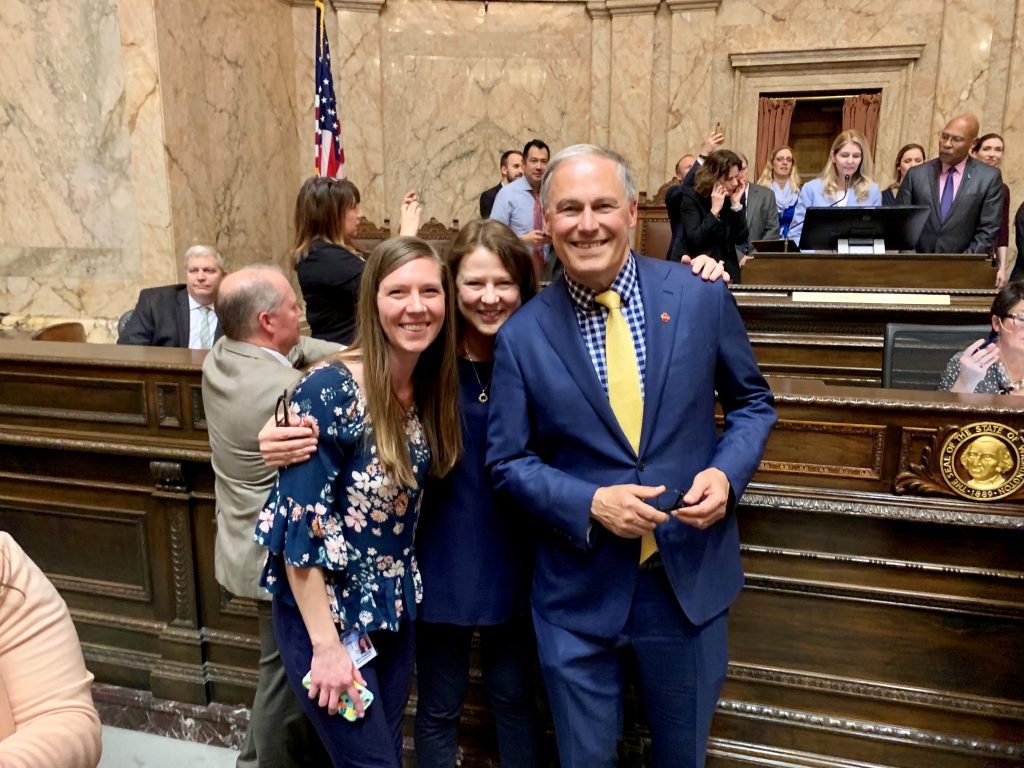Dear Friends and Neighbors,
I am excited to share my first post-session legislative update as your state representative! This was also the first time the legislature finished negotiating a state operating budget on time since 2009.

My Legislative Assistant Michelle and I had the opportunity to celebrate Sine Die with the Governor!
We had an incredibly successful session, and I am proud that five of my bills have made it through the legislative process to become law. The bills I passed this session focused on providing communities with more resources for affordable housing, protecting consumers, and supporting small businesses.
I will share updates on the final budget and priority policy outcomes in my next e-newsletter. In the meantime, please continue to reach out about what is on your mind.
Sincerely,

Bills I introduced that passed this Session:
Providing Existing Real Estate Excise Tax Revenue for Affordable Housing
This legislation authorizes cities and counties to use existing real estate excise tax revenue (also known as REET II) to support affordable housing and homelessness projects. This is not a new tax, instead this bill (HB 1219) extends the sunset cap on using REET II revenue for affordable housing projects until January 1, 2026. Cities were reluctant to use this program because of the existing sunset of June 30, 2019, which is why it was essential to extend the sunset.
Our state is in a housing affordability crisis, and we need to allow our cities and counties to use REET II funds not only for infrastructure investments, but also to invest in affordable housing. While infrastructure is important, our communities are not complete if we do not provide people with affordable places to live. As former Mayor of Kirkland, I am proud that Kirkland has used REET II revenue to invest $1.5 million in the first homeless shelter for women and families on the eastside of King County and look forward to more affordable housing projects in our communities.
Scan Down Allowances
A scan-down allowance occurs in the grocery industry when a manufacturer provides a grocer with payment or credit for selling a specific product during a specific time frame. HB 1354 clarifies that a scan down allowance passed on from a manufacturer to a customer by a retailer, is not revenue to the retailer, and therefore should not be subject to business and occupation tax. I believe this bill is important for the grocery industry as this is a low margin industry that struggles under the regressive B&O tax structure.
Housing Religious Zoning
Religious organizations have been partners in providing affordable housing and are working to prevent homelessness. Places of worship often have excess property that could be used to create housing for families. HB 1377 allows an increased density bonus for certain affordable housing development on property owned or controlled by a religious organization. This bill was a continuation of the work started by my predecessor, Representative Joan McBride, and I worked on this bill in partnership with faith communities across the state.
Gift Cards
Expiration dates are not allowed for any gift cards or gift certificates, and HB 1727 prohibits gift certificates and gift cards from charging dormancy or inactivity fees. However, expiration dates are allowed if the gift certificate is issued pursuant to an awards or loyalty program. This bill will help with consumer protection and will apply to all gift cards purchased and used in the state of Washington.
Payment Limitations Period
This is a consumer protection bill that ensures that debt collection cannot continue after the statute of limitations has expired. I am extremely concerned about the cycle of debt that burdens many in our communities. Debt is often sold and resold, and collection activity takes place eight to ten years after the debt is incurred. This type of debt haunts people and is referred to as “zombie debt.” If a debtor even acknowledges or promises to pay the debt, or pays even a dollar, then the statute of limitations is revived. HB 1730 had the support of Washington Attorney General Bob Ferguson, Washington Collectors Association, Statewide Poverty Action Network, and Washington State Association for Justice.
